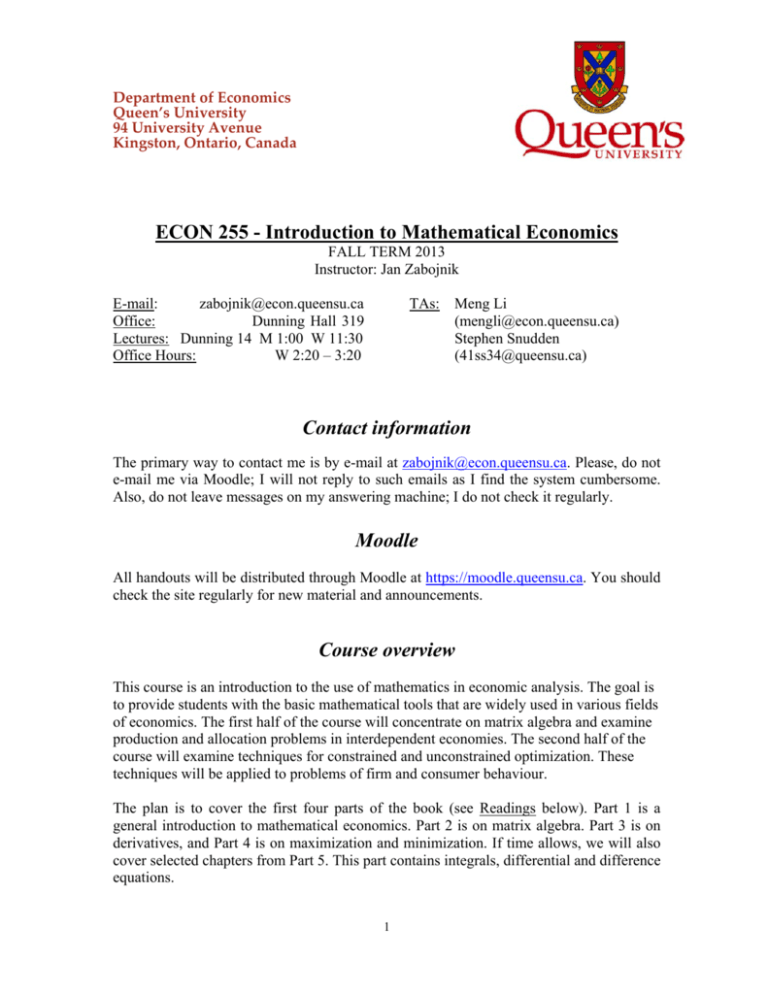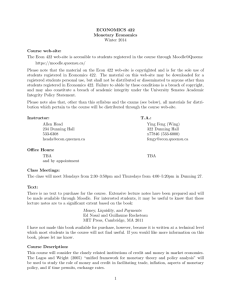Fall 2013 Syllabus - Queen's Economics Department
advertisement

Department of Economics Queen’s University 94 University Avenue Kingston, Ontario, Canada ECON 255 - Introduction to Mathematical Economics FALL TERM 2013 Instructor: Jan Zabojnik TAs: E-mail: zabojnik@econ.queensu.ca Office: Dunning Hall 319 Lectures: Dunning 14 M 1:00 W 11:30 Office Hours: W 2:20 – 3:20 Meng Li (mengli@econ.queensu.ca) Stephen Snudden (41ss34@queensu.ca) Contact information The primary way to contact me is by e-mail at zabojnik@econ.queensu.ca. Please, do not e-mail me via Moodle; I will not reply to such emails as I find the system cumbersome. Also, do not leave messages on my answering machine; I do not check it regularly. Moodle All handouts will be distributed through Moodle at https://moodle.queensu.ca. You should check the site regularly for new material and announcements. Course overview This course is an introduction to the use of mathematics in economic analysis. The goal is to provide students with the basic mathematical tools that are widely used in various fields of economics. The first half of the course will concentrate on matrix algebra and examine production and allocation problems in interdependent economies. The second half of the course will examine techniques for constrained and unconstrained optimization. These techniques will be applied to problems of firm and consumer behaviour. The plan is to cover the first four parts of the book (see Readings below). Part 1 is a general introduction to mathematical economics. Part 2 is on matrix algebra. Part 3 is on derivatives, and Part 4 is on maximization and minimization. If time allows, we will also cover selected chapters from Part 5. This part contains integrals, differential and difference equations. 1 Prerequisites: ECON 110 or 111*+112*, MATH 126 or MATH 121, or equivalent. Readings: The required textbook is Fundamental Methods of Mathematical Economics, 4th edition, by Alpha C. Chiang and Kevin Wainwright, McGraw-Hill, 2005. Lectures may cover material beyond that contained in the textbook. Evaluation and course policies Your grade will be computed as follows: Homeworks (6 out of 8) Midterm (October 21) Final Exam 20% 35% 45% Important: The course policies explained here will not be renegotiated. I will not respond to individual requests for re-weighting, extra credit, and other individual exceptions from the grading scheme. Homeworks 6 out of 8 homework assignments will count towards your final grade. The two “drops” are your insurance against a family problem, the flu, and so on. The Assignment Drop Box for ECON 255 will be on the 2nd floor of Dunning Hall and will disappear exactly at the due time on the due date (indicated on the assignment). Assignments that are late or dropped in the wrong box will be penalized by a score reduction of 50% (if received on the due date). An assignment received after the due date will get no credit. Students are expected to complete their assignments independently. Assignments that look like copies of each other will all receive zero credit. Assignments must be submitted in legible form (Regulation 6 in the A&S 2013-2014 Academic Regulations). If a TA or I find it hard to read a student’s assignment, the student will be asked to submit all subsequent assignments in typewritten form. Midterm and Final Exam There will be one in-class midterm, on Monday, October 21. Please make sure you don’t have any conflicts on that date. No make-up exam will be given. If you miss the midterm for a legitimate reason, I will reallocate the corresponding weight to the final (i.e., your final will count 80%). Electronic organizers, cell phones, books, and notes may not be used during exams. The only calculators that are allowed are the Casio 991 series and those with a Gold Applied Science approval sticker or a Blue Commerce approval sticker. 2 Re-grading If you believe a mistake was made in grading your work, please send an email to the TA who marked it and describe the problem (even if it is just an inquiry on something unclear or you want to point out an error in summing up the score). Any request for re-grading or inquiry about a missing assignment must be submitted within two weeks after the assignment/exam is available in the Distribution Center. If after the TA’s response you are still not satisfied that your work was graded fairly, please bring the issue to my attention and I will make a final decision. If you only wish to discuss with me your answers without asking for re-grading, I will be happy to do that. Numbers In, Letters Out All assignments and exams in this course will receive numerical marks. Your final grade for the course will be derived by converting your numerical percentage course average to a letter grade according to Queen’s Official Grade Conversion Scale, which can be found at: http://www.queensu.ca/artsci/academics/undergraduate/current/new-grading-scheme Class Etiquette and Academic Integrity Class Etiquette Please turn your cell phones, beepers and pagers off before entering the class. Please arrive on time. Academic Integrity Academic integrity is constituted by the five core fundamental values of honesty, trust, fairness, respect and responsibility (see www.academicintegrity.org). These values are central to the building, nurturing and sustaining of an academic community in which all members of the community will thrive. Adherence to the values expressed through academic integrity forms a foundation for the "freedom of inquiry and exchange of ideas" essential to the intellectual life of the University (see the Senate Report on Principles and Priorities). Students are responsible for familiarizing themselves with the regulations concerning academic integrity and for ensuring that their assignments conform to the principles of academic integrity. Information on academic integrity is available in the Arts and Science Calendar (see Academic Regulation 1), on the Arts and Science website (see http://www.queensu.ca/artsci/sites/default/files/Academic_Regulations.pdf), and from the instructor of this course. Departures from academic integrity include plagiarism, use of unauthorized materials, facilitation, forgery and falsification, and are antithetical to the development of an academic community at Queen's. Given the seriousness of these matters, actions which contravene the regulation on academic integrity carry sanctions that can range from a warning or the loss of grades on an assignment to the failure of a course to a requirement to withdraw from the university. 3 Tentative Schedule The schedule below is tentative; it is likely that we will deviate from it or even omit/add some topics. Week 1 (9/9 & 9/11) The Nature of Mathematical Economics Economic Models Equilibrium Analysis in Economics Readings: Ch. 1; Ch. 2.1-2.3 (through p. 11); Ch. 2.4-2.6 Week 2 (9/16 & 9/18) Linear Models and Matrix Algebra Readings: Ch. 3 (exclude Higher-Degree Polynomial Equations, pp. 38-40), Ch. 4.1-4.2 Week 3 (9/23 & 9/25) Linear Models and Matrix Algebra (continued) Readings: Ch. 4.3-4.6 Week 4 (9/30 & 10/2) Linear Models and Matrix Algebra (continued) Readings: Ch. 5.1-5.4 Week 5 (10/7 & 10/9) Linear Models and Matrix Algebra (continued) Readings: Ch. 5.5-5.7 Week 6 (10/14 & 10/16) Monday 10/14 is the Thanksgiving Day (classes will not be held) Comparative Statics and the Concept of Derivative Readings: Ch. 6.1-6.7 Week 7 (10/21 & 10/23) MIDTERM (Monday 10/21) Rules of Differentiation and Their Use in Comparative Statics Readings: Ch. 7.1-7.5 4 Week 8 (10/28 & 10/30) Comparative-Static Analysis of General-Function Models Readings: Ch. 8.1-8.4 (through p. 191); Ch. 8.5 (through p. 199); Ch. 8.6 (through p. 210) Week 9 (11/4 & 11/6) Optimization: A Special Variety of Equilibrium Analysis Readings: Ch. 9 Week 10 (11/11 & 11/13) Exponential and Logarithmic Functions (review on your own) The Case of More Than One Choice Variable Readings: Ch. 10.1-10.5, Ch. 11.1, Ch. 11.3-11.4, Ch. 11.5 (through p.324), Ch. 11.6 Week 11 (11/18 & 11/20) Optimization with Equality Constraints Readings: Ch. 12.1-12.2, Ch. 12.3 (through p.360), Ch. 12.5 (through p.376), Ch. 12.6 Week 12 (11/25 & 11/27) Optimization with Equality Constraints Further Topics in Optimization Readings: Ch. 13.1-13.6 Copyright notice: This material is copyrighted and is for the sole use of students registered in ECON 255. This material shall not be distributed or disseminated to anyone other than students registered in ECON 255. Failure to abide by these conditions is a breach of copyright, and may also constitute a breach of academic integrity under the University Senate's Academic Integrity Policy Statement. 5







